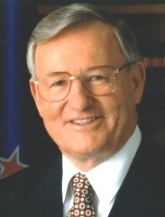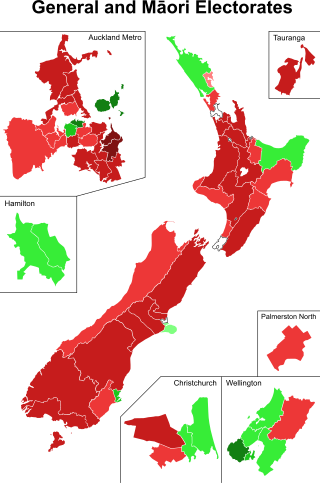Mixed-member proportional representation is a mixed electoral system which combines local majoritarian elections with a compensatory tier of party list votes, which are used to allocate additional members in a way that aims to produce proportional representation overall. In most MMP systems, voters get two votes: one to decide the representative for their single-seat constituency, and one for a political party. Some countries use single vote variants of MMP, although this article focuses primarily on dual vote versions of MMP.

The New Zealand Parliament is the unicameral legislature of New Zealand, consisting of the Sovereign (King-in-Parliament) and the New Zealand House of Representatives. The King is usually represented by his governor-general. Before 1951, there was an upper chamber, the New Zealand Legislative Council. The New Zealand Parliament was established in 1854 and is one of the oldest continuously functioning legislatures in the world. It has met in Wellington, the capital of New Zealand, since 1865.

Electoral reform in New Zealand has been a political issue in the past as major changes have been made to both parliamentary and local government electoral systems.

New Zealand is a representative democracy in which members of the unicameral New Zealand Parliament gain their seats through elections. General elections are usually held every three years; they may be held at an earlier date at the discretion of the prime minister, but that usually only happens in the event of a vote of no confidence or other exceptional circumstances. A by-election is held to fill an electorate vacancy arising during a parliamentary term. The most recent general election took place on 14 October 2023.

The Electoral Reform Society (ERS) is an independent campaigning organisation based in the United Kingdom which promotes electoral reform. It seeks to replace first-past-the-post voting with proportional representation, advocating the single transferable vote, and replacing the House of Lords. It is the world's oldest operating organisation concerned with political and electoral reform.

The 1993 New Zealand general election was held on 6 November 1993 to determine the composition of the 44th New Zealand Parliament. Voters elected 99 members to the House of Representatives, up from 97 members at the 1990 election. The election was held concurrently with an electoral reform referendum to replace the first-past-the-post system, with all members elected from single-member electorates, with mixed-member proportional representation. It saw the governing National Party, led by Jim Bolger, win a second term in office, despite a major swing away from National in both seats and votes, and the carrying of the referendum by 53.9% to 46.1%.
Canada holds elections for legislatures or governments in several jurisdictions: for the federal (national) government, provincial and territorial governments, and municipal governments. Elections are also held for self-governing First Nations and for many other public and private organizations including corporations and trade unions. Municipal elections can also be held for both upper-tier and lower-tier governments.
The Citizens' Assembly on Electoral Reform was created by the government of British Columbia, Canada to investigate changes to the provincial electoral system. On October 25, 2004, the citizens' assembly proposed replacing the province's existing first past the post (FPTP) system with BC-STV, a single transferable vote (STV) system. This recommendation was put to the electorate in a referendum in 2005 held during that year's provincial election. The provincial government required the referendum to achieve a super-majority of 60 percent of voters and simple majorities in 60 percent of the 79 districts in order to pass. The second of these thresholds was easily met, with a majority supporting the reform in 77 out of 79 electoral districts, but the overall vote fell short of the 60 percent requirement, with 57.69 percent of the votes in favour. A second referendum in 2009 on adopting the STV system also failed to pass carrying 8 electoral districts and 39.09 percent of the overall vote.

A referendum was held on October 10, 2007, on the question of whether to establish a mixed member proportional representation (MMP) system for elections to the Legislative Assembly of Ontario. The vote was strongly in favour of the existing plurality voting or first-past-the-post (FPTP) system.

The Royal Commission on the Electoral System was formed in New Zealand in 1985 and reported in 1986. The decision to form the Royal Commission was taken by the Fourth Labour government, after the Labour Party had received more votes, yet it won fewer seats than the National Party in both the 1978 and 1981 elections. It was also a reaction to the power displayed by Prime Minister Robert Muldoon, whose action of illegally abolishing the Superannuation scheme in 1975 without any repercussions highlighted the need to distribute power in a more democratic way. The Royal Commission's report Towards a Better Democracy was instrumental in effecting New Zealand to change its electoral system from first-past-the-post to mixed member proportional.

The New Zealand electoral system has been mixed-member proportional (MMP) since the 1996 election. MMP was introduced following a referendum in 1993. It replaced the first-past-the-post (FPP) system New Zealand had previously used for most of its history. Under MMP, New Zealanders have two secret ballot votes to elect members of Parliament (MPs). The first vote is for a candidate from an electorate, a geographic electoral district. The second is the party vote for the political party the voter wants to form the government.

Referendums are held only occasionally by the Government of New Zealand. Referendums may be government-initiated or held in accordance with the Electoral Act 1993 or the Citizens Initiated Referenda Act 1993. Nineteen referendums have been held so far ; fourteen were government-led, and five were indicative citizen initiatives.
The Fourth National Government of New Zealand was the government of New Zealand from 2 November 1990 to 27 November 1999. Following electoral reforms in the 1996 election, Jim Bolger formed a coalition with New Zealand First. Following Bolger's resignation, the government was led by Jenny Shipley, the country's first female prime minister, for the final two years.
A referendum was held in the Canadian province of Prince Edward Island on November 28, 2005, to determine whether to adopt the Mixed Member Proportional (MMP) system as recommended by the Prince Edward Island Electoral Reform Commission in 2003.
The Electoral Reform Coalition (ERC) is a group advocating electoral reform in New Zealand. It was founded in 1986. The group has been reformed as the Campaign for MMP to fight to retain Mixed-member proportional representation at the 2011 referendum on the issue.
The 2011 New Zealand voting system referendum was a referendum on whether to keep the existing mixed member proportional (MMP) voting system, or to change to another voting system, for electing Members of Parliament to New Zealand's House of Representatives. It was held on 26 November 2011 in conjunction with the 2011 general election.
Electoral reform is a change in electoral systems which alters how public desires are expressed in election results.

The United Kingdom Alternative Vote referendum, also known as the UK-wide referendum on the Parliamentary voting system was held on Thursday 5 May 2011 in the United Kingdom (UK) to choose the method of electing MPs at subsequent general elections. It occurred as a provision of the Conservative–Liberal Democrat coalition agreement drawn up in 2010 and also indirectly in the aftermath of the 2009 expenses scandal. It operated under the provisions of the Parliamentary Voting System and Constituencies Act 2011 and was the first national referendum to be held under provisions laid out in the Political Parties, Elections and Referendums Act 2000.

The 2020 New Zealand cannabis referendum was a non-binding referendum held on 17 October 2020 in conjunction with the 2020 general election and a euthanasia referendum, on the question of whether to legalise the sale, use, possession and production of recreational cannabis. It was rejected by New Zealand voters. The form of the referendum was a vote for or against the proposed "Cannabis Legalisation and Control Bill". Official results were released by the Electoral Commission on 6 November 2020 with 50.7% of voters opposing the legalisation and 48.4% in support.

A referendum on electoral reform took place by mail-in ballot between October 22 and December 7, 2018, in the Canadian province of British Columbia. 61.3 percent of voters supported maintaining the first-past-the-post voting system rather than switching to a proportional representation voting system, which was supported by 38.7 percent of voters. This was British Columbia's third referendum on electoral reform, following ones in 2005 and 2009.







